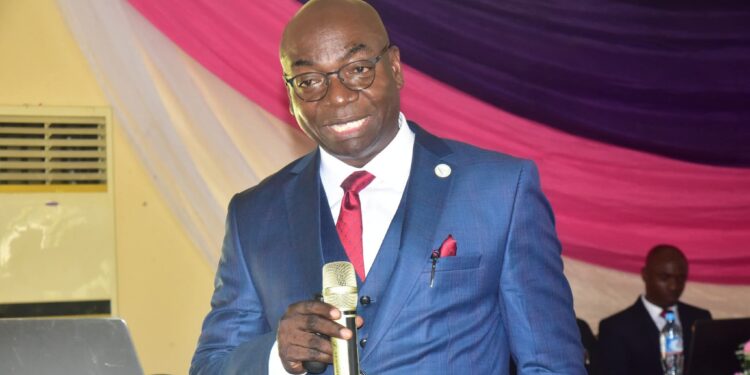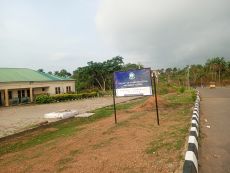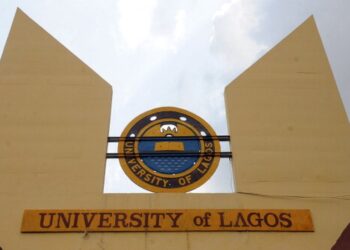As global economies sprint toward digital transformation, African nations must seize the moment or risk being left behind. That was the resounding message from the 2025 Entrepreneurship Eminent Personality Lecture hosted by the Department of Entrepreneurship, School of Logistics and Innovation Technology at the Federal University of Technology, Akure (FUTA), where experts called for financial innovation as a critical lever for economic survival and transformation.
Keynote speaker Professor Olorunsola Olowofeso, former Director-General of the West African Monetary Institute, who delivered a compelling address on “Financial Innovation and Enterprise Growth in Emerging Technology” described financial innovation as a powerful tool to unlock enterprise development, expand access to capital, reduce exclusion, and unleash new sectors of opportunity, particularly for developing economies like Nigeria’s.
Harping on a acquiring and executing a digital economy blueprint which underscores that Nigeria’s financial ecosystem is shifting from traditional banking models to digital-first frameworks, biometric banking, blockchain-backed contracts, and digital payments are no longer futuristic—they are essential infrastructure. However, scaling their impact requires strong public-private partnerships, responsive policies, and coordinated implementation.
He said that “Nigeria cannot afford to miss this digital wave. Let us shape a future where finance empowers, innovation transforms, and prosperity reaches every corner of our continent.” “Financial innovation is not a luxury, it is a national imperative,” Olowofeso he added. “Nations that delay in embracing digital finance, AI, blockchain, and platform-based enterprise models will remain structurally limited in a tech-driven global economy.”
While calling for financial innovation to become a policy, technology to become a culture, and education to fuel transformation, Olowofeso further emphasized financial inclusion, especially for women, youth, and micro, small, and medium-sized enterprises (MSMEs). These groups, he noted, are often the most vulnerable yet the most critical to national development, hence supporting them with smart regulation, digital literacy, and inclusive finance can unleash a virtuous cycle of productivity, resilience, and sustainability.
He challenged students and stakeholders alike to act with bold innovation, leverage global trends, and deploy digital tools for transformative impact, emphasizing AI, cloud computing, digital banking, and mobile transactions. Olowofeso also said that emerging technologies must be harnessed to scale local enterprises, increase productivity, and create inclusive growth.
In a rousing appeal to students in particular, Professor Olowofeso called on the next generation to rise as innovators and change makers. “Universities like FUTA must be the engine room where research sparks innovation, and where education becomes the catalyst for national transformation,” he said.
In her address which centered on FUTA being a Launchpad for digital enterprise, the Vice Chancellor Professor Adenike Oladiji highlighted the University’s evolving role as a national innovation hub. “This is not just about education; it is about activating Nigeria’s future through knowledge and technology. Financial innovation must be embedded into our systems of training and development,” she said. “We must go beyond traditional instruction. Financial innovation must be embedded into our systems of training, research, and institutional development. It must shape how we teach, how we solve problems, and how we engage with the economy”, She declared.
Professor Oladiji also noted that the University is intensifying efforts to integrate digital tools and innovation-driven thinking across its curricula, especially in entrepreneurship, engineering, and ICT-related fields. According to her, FUTA is committed to producing future-ready graduates who are not only employable but equipped to create jobs, design solutions, and lead in a fast-changing digital economy.
She stressed the importance of cross-disciplinary collaboration, urging departments and schools within the University to align their teaching and research outputs with the realities of the fourth industrial revolution. “From biometric banking to blockchain-backed contracts and real-time data analytics, these are not theoretical concepts—they are redefining global competitiveness. We must educate for relevance, train for innovation, and collaborate for impact,” she concluded.
Delivering his remarks on behalf of the School of Logistics and Innovation Technology (SLIT), the Dean, Professor Olayemi Simon-Oke expressed deep appreciation on the remarkable progress made in positioning the school as a hub of academic excellence and innovation. He highlighted FUTA’s commitment to fostering an enabling environment where research, enterprise, and strategic thinking converge to address the dynamic needs of today’s knowledge-driven economy. He noted that the SLIT had continued to grow in strength, relevance, and responsiveness through the dedication of staff and visionary leadership of the University management. According to him, FUTA is proud of its role in nurturing students who are not only employable but also capable of contributing meaningfully to national development across diverse sectors.
Professor Simon-Oke described the event as especially significant, as it celebrated individuals whose outstanding contributions to innovation, leadership, and enterprise exemplify the ideals FUTA strives to instill in its students. He emphasized the university’s broader mission to uphold the highest standards of scholarship, innovation, and societal impact. To the Awardees, he said “As we honour your contributions, we are also inspired to continue on the path of academic excellence, innovation, and societal impact.” Congratulating the award recipients, he encouraged continued collaboration and innovation among academia, industry, and policymakers to drive Nigeria’s progress in the digital age, stressing that the intersection of academia, enterprise, and public policy is essential. He said the nation could not afford to work in isolation as coordinated innovation across government, Universities, and industry is the only way to accelerate national progress.
Earlier, the Acting Head of the Department of Entrepreneurship, Dr. Edamisan Olowofeso, emphasized that the categories of awards presented were a direct reflection of FUTA’s rising status as a national hub for enterprise education. He noted that the University’s curriculum and research focus are increasingly aligned with solving real-world challenges, especially in the areas of innovation, youth empowerment, and technology-driven entrepreneurship. According to him, the event served as both a celebration of excellence and a reaffirmation of FUTA’s commitment to preparing students who can thrive in a rapidly evolving global economy.
Dr. Olowofeso stressed that FUTA is not just focused on producing graduates with academic qualifications, but on raising solution-oriented minds capable of driving meaningful change across sectors. He said the goal is to nurture problem-solvers, not just job seekers but individuals who can initiate, innovate, and lead. He praised the University’s strategic shift toward experiential learning, industry collaboration, and digital literacy as key elements in developing graduates who are prepared to contribute significantly to Nigeria’s socio-economic transformation.
In closing, Professor Abolaji Dada, Chair of the Local Organising Committee, summed up the event’s significance, saying “this moment belongs to Nigeria’s digital economy. From the heart of its Universities, we must light the path for inclusive, tech-driven growth.”
The event celebrated thought leaders across medipreneurship, leadership, agripreneurship, gender empowerment, and youth development championing innovation and national development through Distinguished Awards of Excellence.
The Awardees are:
Dr Taiwo Fasoranti
Honourable Ifedayo Abegunde
HRH Olori Olufnmilayo Ajibola-Oluyede
Honourable Clever Osuma Inodu
Dr (Hon) Jibayo Adeyeye Esq.
Dr Seun Bosede Osamaye



















































































 EduTimes Africa, a product of Education Times Africa, is a magazine publication that aims to lend its support to close the yawning gap in Africa's educational development.
EduTimes Africa, a product of Education Times Africa, is a magazine publication that aims to lend its support to close the yawning gap in Africa's educational development.